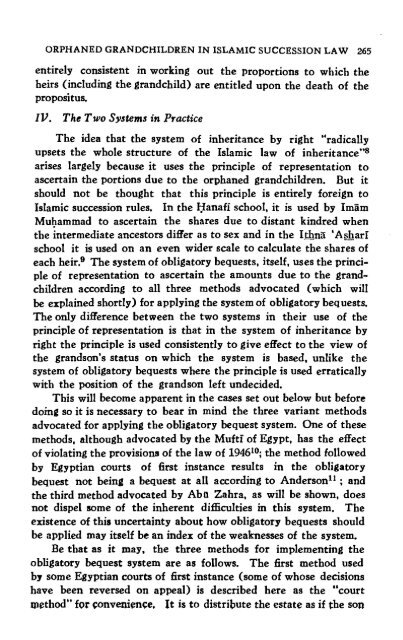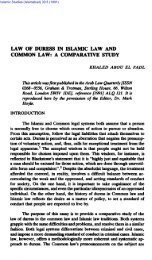ORPHANED GRANDCHILDREN IN ISLAMIC SUCCESSION LAW
ORPHANED GRANDCHILDREN IN ISLAMIC SUCCESSION LAW
ORPHANED GRANDCHILDREN IN ISLAMIC SUCCESSION LAW
You also want an ePaper? Increase the reach of your titles
YUMPU automatically turns print PDFs into web optimized ePapers that Google loves.
<strong>ORPHANED</strong> <strong>GRANDCHILDREN</strong> <strong>IN</strong> <strong>ISLAMIC</strong> <strong>SUCCESSION</strong> <strong>LAW</strong> 265<br />
entirely consistent in working out the proportions to which the<br />
heirs (including the grandchild) are entitled upon the death of the<br />
propositus.<br />
IY. The Two Systems in Practice<br />
The idea that the system of inheritance by right "radically<br />
upsets the whole structure of the Islamic law of inheritancews<br />
arises largely because it uses the principle of representation to<br />
ascertain the portions due to the orphaned grandchildren. But it<br />
should not be thought that this principle is entirely foreign to<br />
Islamic succession rules. In the Hanafi school, it is used by Im'im<br />
Muhammad to ascertain the shares due to distant kindred when<br />
the intermediate ancestors differ as to sex and in the Ihna 'Ahari<br />
school it is used on an even wider scale to calculate the shares of<br />
each heir? The system of obligatory bequests, itself, uses the princi-<br />
ple of representation to ascertain the amounts due to the grand-<br />
children according to all three methods advocated (which will<br />
be explained shortly) for applying the system of obligatory bequests.<br />
The only difference between the two systems in their use of the<br />
principle of representation is that in the system of inheritance by<br />
right the principle is used consistently to give effect to the view of<br />
the grandson's status on which the system is based. unlike the<br />
system of obligatory bequests where the principle is used erratically<br />
with the position of the grandson left undecided.<br />
This will become apparent in the cases set out below but before<br />
doing so it is necessary to bear in mind the three variant methods<br />
advocated for applying the obligatory bequest system. One of these<br />
methods, although advocated by the Mufti of Egypt, has the effect<br />
of violating the provisions of the law of 1946l0; the method followed<br />
by Egyptian courts of first instance results in the obligatory<br />
bequest not being a bequest at all according to Anderson1] ; and<br />
the third method advocated by Abo Zahra, as will be shown, does<br />
not dispel some of the inherent difficulties in this system. The<br />
existence of this uncertainty about how obligatory bequests should<br />
be applied may itself be an index of the weaknesses of the system.<br />
Be that as it may. the three methods for implementing the<br />
obligatory bequest system are as follows. The first method used<br />
by some Egyptian courts of first instance (some of whose decisions<br />
have been reversed on appeal) is described here as the "court<br />
method" for convenience, It is to distribute the estate as if the son
















